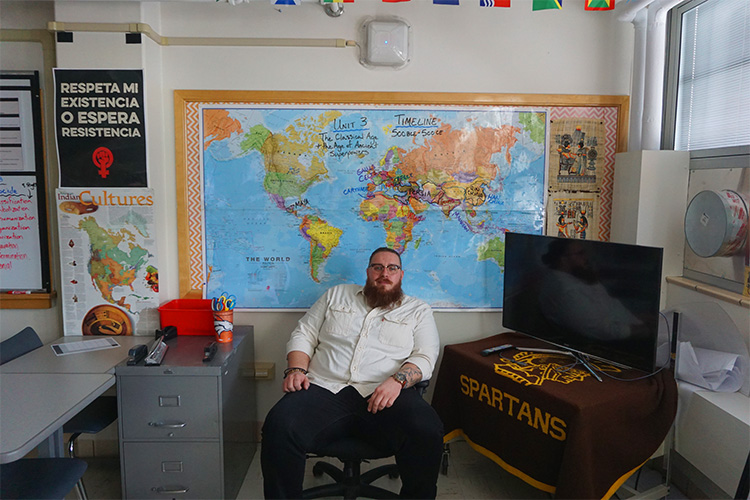
"Historian Nicholas Long gazes in contemplation of the bronze age collapse and the mysterious sea people." - Ravi Apte, amateur history buff; photo by Emmanuel Morales-Gomez
“Ancient History is a lot cooler than US History with Mr. Klimczak because you don’t have to listen to Mr. Klimczak.” – Mr. Long
At a young age, Nic Long’s grandma gifted him a necklace bearing his name in hieroglyphics, from that moment on he was inspired to learn more about the history of the ancient world. Driven by his grandma’s love for and interest in Ancient Egypt, Long has dedicated his profession to the wondrous world of ancient history.
For as long as he can remember, Long has found the mysteries within the subject of ancient history as a motivation to learn more about the origins of modern day society. With less information from the ancient world to study, Long views topics regarding ancient civilizations as abstract and intriguing. He explains that ancient history is a lot harder to visualize compared to U.S. history due to the lack of pictures and videos. “I think that sometimes with ancient history… it almost feels like a blend of history and a fantasy novel just because some of this stuff seems so abstract and part of a different world,” he said. Teaching Ancient History gives Long opportunities to share his passion and knowledge with the younger generation. He expresses that, “…as a society, we aren’t as fascinated by deep history; we want the history we can grab onto easier instead of the history that is difficult to figure out. I like all the puzzle pieces trying to fit those together, but it also makes for a lot of fun facts, like showing high schoolers how Mayan sacrifices happened.” When asked about Long’s class, sophomore Cora Grabel stated, “I like how he and his class help me broaden my horizons.”
Long believes that knowledge about our deep past can lead to understanding of our early origins. He also believes that researching global history can widen people’s perspectives on other cultures and early civilizations. Long expressed that a narrow focus on just an individual part of history in the world can lead to incorrect assumptions about humanity’s origins and the reasons behind our everyday lives, saying, “When we only learn about our own country and our own culture…it breeds nationalism, and I think nationalism is dangerous. Being too proud of the country that we are from, or only knowing our history, limits all of the incredible things that have happened before the foundation of the United States.”
Along with teaching Ancient History, Long participates in the History of the Week segment on renowned news broadcast, the Spartan Edition. Every week, he puts together a collection of events that happened in the current week in history. He describes events from every corner of the earth during a wide array of time periods. The diversity within this news segment allows students to really process the lengthy and complicated history of humanity. Long decided to participate in the History of the Week segment because, as he said, “I like bringing in multiple histories so that people recognize that our calendar is obviously cyclical. There are many things that happen during the 365 days that exist in our calendar, and I think it’s kinda cool to be like, yo, the end of the Punic Wars happened this Monday, February 5th.”
Outside of school, Long enjoys listening to and discussing music with people, along with going to concerts and stand up comedy shows. He also enjoys traveling and spending time in nature. He explains that he could spend hours in nature taking in the scenery and simply enjoying all of the sights and sounds. When asked what his favorite travel destination is, he replied, “… I would say the top two are Greece and Croatia…there is this national park in Croatia that has seventeen lakes and they waterfall into the next one… it was so cool. It was like being in The Lord of the Rings.”
Ancient History is a subject that will always be valuable to the youth and society in general. Without information on the ancient world and the civilizations that built society today, there would be no appreciation for the cultures that make this world so unique. Long’s immense passion for Ancient History continues to inspire students to look at the world through newfound lenses, and the spread of lesser-known knowledge will always allow people to acquire essential information that in turn creates a beautiful sense of individuality.